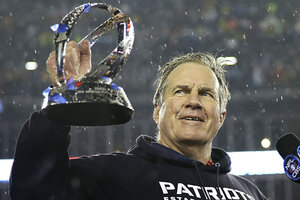Deflategate: Does Bill Belichick know when to stop tinkering?
The NFL is investigating claims that the New England Patriots illegally under-inflated their footballs. For coach Bill Belichick, Deflategate could be defining.

New England Patriots head coach Bill Belichick holds the championship trophy after the NFL football AFC Championship game Sunday, Jan. 18, 2015, in Foxborough, Mass. The Patriots defeated the Colts 45-7 to advance to the Super Bowl against the Seattle Seahawks. Now, Belichick is dogged by accusations of cheating.
(AP Photo/Matt Slocum)
Boston
When history looks back on New England Patriots coach Bill Belichick's remarkable career, Sunday's 45-7 demolition of the Indianapolis Colts might serve as the Cliff's Notes.
There was genius in heaping portions: The Colts' rising-star quarterback completely befuddled, the Colts' not-ready-for-prime-time defense abjectly humiliated, even a dollop of the unorthodox offensive formations that had the Baltimore Ravens chasing invisible receivers the week before. Just because.
But since Sunday's demolition, there has also been controversy.
Confirming reports, the National Football League has found that 11 of the 12 footballs used by the Patriots' offense were underinflated, according to ESPN. With the game played in a rainstorm, underinflated footballs would have been an advantage; they're easier for quarterbacks to throw and receivers to catch. Indeed, the emerging scandal began when an Indianapolis Colts linebacker noticed the difference after he intercepted Patriots quarterback Tom Brady.
The NFL has not yet finished its investigation. Perhaps science can explain the balls losing pressure in the cool air. But history offers compelling reasons to think otherwise.
Belichick, after all, was the man behind "Spygate," in which the Patriots illegally stole the New York Jets' defensive signals. That led to the biggest fine for a coach in NFL history ($500,000) and the loss of the Patriots' first-round draft pick in 2008.
And about those unorthodox offensive formations against the Baltimore Ravens two weeks ago.... Were they legal? Yes, the NFL said. Did Belichick push the letter of the law to the teetering edge to do it. Absolutely.
There is a genius in that.
It is Belichick whose bar room brawl tactics against Colts receivers in the 2003 AFC title game were so controversial that they led to the current trend toward referees treating wide receivers like the White House china collection; the slightest rough touch brings a flag.
It is Belichick who was one of the early adopters of a greater willingness to go for it on fourth down, challenging a chronically risk-averse coaching fraternity to examine long-held assumptions.
It is Belichick who has pushed football's week-by-week game plans further than any other current coach, radically changing how his team plays every week to leave opponents guessing at what the Patriots will do.
In a game of copycats, Belichick is relentlessly original, a serial tinkerer. To him, conventional wisdom is the snare of the timid.
"That’s what separates him from so many of the other smart guys in the NFL. If it can be done, Belichick will do it. You don’t like it, change the rule. You catch me, fine me. It’s worth it," notes Ernie Palladino of CBS New York.
But was Spygate worth it? If Belichick is found to have had a hand in "Deflategate," would that be worth it?
45-7.
That was Sunday's score. Did underinflated footballs account for 38 points of Colts ineptitude? Emphatically, no. The Patriots were better than the Colts in every conceivable way, and they were better largely because Belichick made them so through brilliance and hard work.
The Patriots did not need underinflated footballs, just as, in 2007, when they had assembled the greatest offensive machine since the invention of the Dreadnought, they probably didn't need to be spying on the Jets. The Patriots won that game in a 38-14 nailbiter.
Depending on how events unfold in coming days, Belichick is perilously close to becoming the Roger Clemens or Barry Bonds of the National Football League.
Today, neither of those players is in the Baseball Hall of Fame, though virtually everyone agrees that they should be. In both cases, they were generational talents. Clemens was a Texas hailstorm 60.5 feet from home plate, Bonds was a licorice whip of power and speed. Both were first ballot hall of famers on talent alone.
But in both cases, that apparently wasn't enough. Strong evidence pointing to steroid use later in their careers has irrevocably tarred their legacies. The moments they gave the sporting world have been diminished.
Everywhere Belichick looks, it would seem, he sees ingenious opportunities to turn a football game to his team's advantage. The question raised is whether that remarkable curiosity can discern the fine lines between ingenious and illegal.
Talk of removing the Patriots from the Super Bowl is ludicrous, but another record fine could be ahead, another lost draft pick, even a lengthy suspension for Belichick.
And, perhaps, an asterisk on a 45-7 victory – and a legendary career – that needed none.

